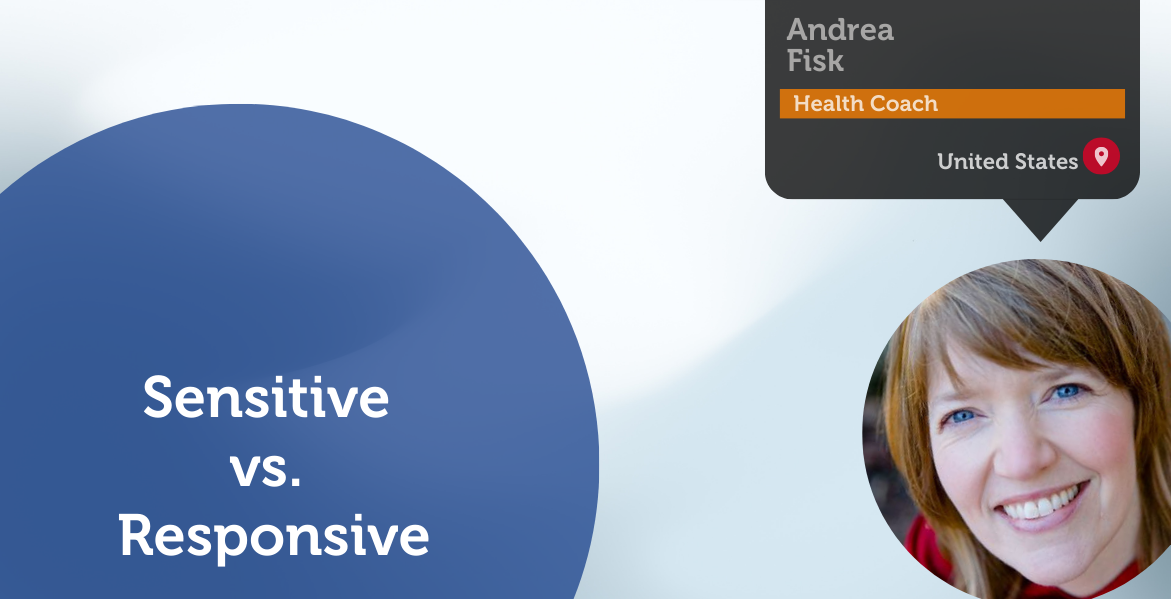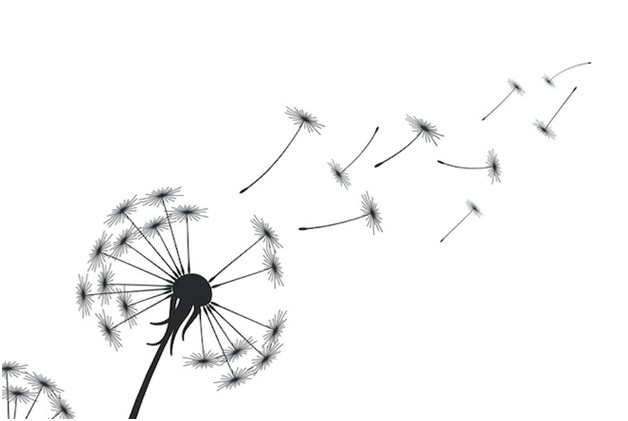A Coaching Power Tool By Andrea Fisk, Health Coach, UNITED STATES

Sensitive vs. Responsive: This one goes out to all of you highly sensitive people!

It seems my heart is made of tissue paper, I wish the world would handle it more delicately. Richelle E. Goodrich
Are you a person who can feel the energy shift before anyone else? Do you often feel at least one of your senses is overloaded every day? Do you have extra pillows, lotions, sleep requirements, dietary requirements, or environmental requirements just to feel good? Does your family have a ‘special name’ for your sensitivities? Are medications often too strong or do you need the children’s dose or the natural form of the medication? When you go to your health care provider do they give you an eye roll or dismissive head shake to say “How could you possibly…?”. Do you feel more, sense more, and respond more than other people?
If you can say yes to these questions, then this tool is for you!
Sensitive vs. Responsive
Sensitive vs. Responsive came from the desire to create a mindset shift in clients who are highly sensitive and in a state of frustration and worry due to their body’s significant reactions to stimuli. When a person is more physically sensitive to the world it can be very destabilizing and can create the feeling of defenselessness. Their awareness of the world is heightened and everything can feel like too much. This can also be a big challenge in healthcare settings.
When someone says “I’m so sensitive” in a healthcare setting, they never mean it as a strength. They often mean that any little change or shift in care can cause a ripple, then a tsunami. They may have problems taking medications or eating certain foods, with very quick and sometimes severe consequences. I like to guide people in these situations to redefine themselves as Responsive. At a doctor’s appointment, we are often complaining about what isn’t working, not what works. The sensitive person is the responsive person. Being responsive is a reframe that helps the client reflect on themselves from a place of strength, and control in this context.
I have been practicing health care for 24 years and I’ve found that all types of people come in with fears, disappointments, and limiting beliefs about how their bodies function. Indeed, limits are always a consequence of illness or injury, even if it’s only for a short time. But if those functional limits or health issues are ongoing a mindset shift can occur, a shift that can disengage people from their healing power and their motivation. This can be especially true for highly sensitive people who are already struggling to accommodate the stimulation.
Definitions
If you Google the definition of the word Sensitive it says “quick to detect or respond to slight changes, signals or influences”. The Google definition of the word Responsive is “acting quickly and positively”.
The highly sensitive person understands that responding quickly is the most important aspect of being highly sensitive and it can work to their advantage. Acknowledging that it doesn’t take much medicine, sleep, diet changes, or rest before these solutions have reestablished balance can help clients advocate for the “less is more approach” with their care. The client that is ready to advocate for themselves is someone who is feeling more confident, more empowered, and more in control of their healing. This person has moved on from feeling defenseless and will feel more resilience in their health.
Why Not a Complete Flip?
In health, we are never aiming for a complete turnover in what is happening because it would be too radical for the body to process. In nature, the forest is both sensitive to change AND responsive to it, and we would like our bodies to be as well.
The Second Wave of This Tool…
Wellness is not a ‘medical fix’ but a way of living a lifestyle sensitive and responsive to all the dimensions of body, mind, and spirit, an approach to life we each design to achieve our highest potential for well-being now and forever. Greg Anderson, author
The second wave of the reframe in this tool is to take the word versus out and replace it with an AND. Sensitive AND Responsive acknowledges that we would prefer bodies that aren’t impossible to impact, and we would never want our bodies to become completely insensitive. Being responsive is a position of strength that can help people come into some control and power regarding their health and their health care.
In Practice…
In my Chinese medicine practice, I normally feel out where the person is in their acceptance process before I go in for questions around this topic. I like to understand what part of their current situation they are struggling with. People are coming in with serious and complicated health diagnoses so it’s important to wait for the right opportunity for a shift.
In healthcare situations, feelings are more intense because they are also happening in the body, which is deeper. So I listen to how they speak and the words they use about their bodies, how they care for themselves, and what they imagine for the future. If they are still in an angry state I work on validation as well as helping them figure out what else could support change, and what they want to see change. If they are feeling especially fearful and their prognosis is not good I also hold off as they may need more information to help them get grounded. Just like in coaching, they will not be ready to recognize the strengths of being sensitive and responsive until they are feeling less intense emotions, along the lines of worry, frustration, mild anxiety, or sadness.
Questions That Could Evoke Awareness in a Coaching Situation With This Tool:
- I heard you use the word sensitive, what does sensitive mean to you?
- How does knowing you are sensitive help you?
- What do you currently value about being sensitive?
- What does being sensitive help you to anticipate?
- How does being sensitive increase your awareness?
- I heard you use the word ______ to describe being sensitive, what part does that play?
- What aspects of being sensitive are assets in your daily life?
- How can you use being sensitive to your advantage?
- Would insensitivity be an advantage to you?
- What would you lose if you took away your sensitivity?
- Would you describe yourself as responsive?
- What comes to mind when I say the word responsive?
- How does the word responsive apply to your current health?
- What does the word responsive mean in this situation?
- How can being responsive make a difference in your care?
- How does knowing you are responsive help you?
- How does being sensitive or responsive work as a strength for you here?